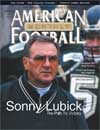AMERICAN FOOTBALL MONTHLY THE #1 RESOURCE FOR FOOTBALL COACHES
Article CategoriesAFM Magazine
|
Coach\'s Guide to Training Room StrategiesProvide optimal fuel and fluid for your playersby: Leslie Bonci, M.P.H., R.D. © More from this issue As coaches, you certainly want athletes who can give it their all day after day. Training camp is a high stress time for you as well as for your players. Not only can this experience be mentally trying, but it is physically demanding as well. Everyone is well aware of the heat-related deaths that received national attention last summer. The bad news is that summers aren’t going to be any cooler, training camp takes place during these hot and humid months, and part of your job needs to be to educate athletes to keep them safe. Gatorade, the National Athletic Trainers Association and the AFCA have collaborated to develop a program (H.E.A.T.) to educate athletes ....The full article can only be seen by subscribers. Subscribe today!
|
|
|||||||
| HOME |
MAGAZINE |
SUBSCRIBE | ONLINE COLUMNISTS | COACHING VIDEOS |
Copyright 2026, AmericanFootballMonthly.com
All Rights Reserved





